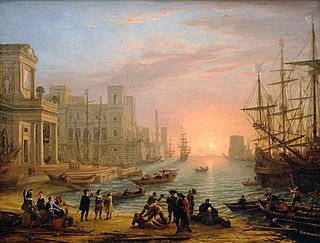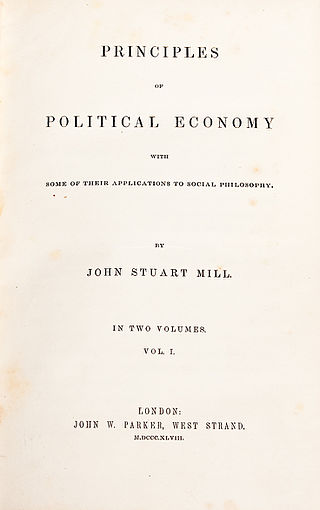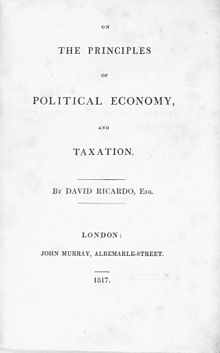
David Ricardo was a British political economist, politician, and member of Parliament. He is recognized as one of the most influential classical economists, alongside figures such as Thomas Malthus, Adam Smith and James Mill.
The labor theory of value (LTV) is a theory of value that argues that the exchange value of a good or service is determined by the total amount of "socially necessary labor" required to produce it. The contrasting system is typically known as the subjective theory of value.

Mercantilism is a nationalist economic policy that is designed to maximize the exports and minimize the imports for an economy. In other words, it seeks to maximize the accumulation of resources within the country and use those resources for one-sided trade.

In economics, a commodity is an economic good, usually a resource, that specifically has full or substantial fungibility: that is, the market treats instances of the good as equivalent or nearly so with no regard to who produced them.
Free trade is a trade policy that does not restrict imports or exports. In government, free trade is predominantly advocated by political parties that hold economically liberal positions, while economic nationalist and left-wing political parties generally support protectionism, the opposite of free trade.
Comparative advantage in an economic model is the advantage over others in producing a particular good. A good can be produced at a lower relative opportunity cost or autarky price, i.e. at a lower relative marginal cost prior to trade. Comparative advantage describes the economic reality of the gains from trade for individuals, firms, or nations, which arise from differences in their factor endowments or technological progress.

Classical economics, also known as the classical school of economics, or classical political economy, is a school of thought in political economy that flourished, primarily in Britain, in the late 18th and early-to-mid 19th century. It includes both the Smithian and Ricardian schools. Its main thinkers are held to be Adam Smith, Jean-Baptiste Say, David Ricardo, Thomas Robert Malthus, and John Stuart Mill. These economists produced a theory of market economies as largely self-regulating systems, governed by natural laws of production and exchange.
In economics, the cost-of-production theory of value is the theory that the price of an object or condition is determined by the sum of the cost of the resources that went into making it. The cost can comprise any of the factors of production and taxation.

In economics, the principle of absolute advantage is the ability of a party to produce a good or service more efficiently than its competitors. The Scottish economist Adam Smith first described the principle of absolute advantage in the context of international trade in 1776, using labor as the only input. Since absolute advantage is determined by a simple comparison of labor productiveness, it is possible for a party to have no absolute advantage in anything.
Economic integration is the unification of economic policies between different states, through the partial or full abolition of tariff and non-tariff restrictions on trade.
The law of the value of commodities, known simply as the law of value, is a central concept in Karl Marx's critique of political economy first expounded in his polemic The Poverty of Philosophy (1847) against Pierre-Joseph Proudhon with reference to David Ricardo's economics. Most generally, it refers to a regulative principle of the economic exchange of the products of human work, namely that the relative exchange-values of those products in trade, usually expressed by money-prices, are proportional to the average amounts of human labor-time which are currently socially necessary to produce them within the capitalist mode of production.
Unequal exchange is used primarily in Marxist economics, but also in ecological economics, to describe the systemic hidden transfer of labor and ecological value from poor countries in the imperial periphery to rich countries and monopolistic corporations in the imperial core due to structural inequalities in the global economy.
The law of rent states that the rent of a land site is equal to the economic advantage obtained by using the site in its most productive use, relative to the advantage obtained by using marginal land for the same purpose, given the same inputs of labor and capital.
Differential ground rent and absolute ground rent are concepts used by Karl Marx in the third volume of Das Kapital to explain how the capitalist mode of production would operate in agricultural production, under the condition where most agricultural land was owned by a social class of land-owners who could obtain rent income from farm production. Rent as an economic category is regarded by Marx as one form of surplus value just like net interest income, net production taxes and industrial profits. Marx's main texts on rent theory can be found in the second (edited) volume of Theories of Surplus Value and in Part 6 of Capital, Volume III. Anwar M. Shaikh states that "These remarkably rich and insightful sections of his work are seldom mentioned in the Marxian literature, and are even less understood."

Principles of Political Economy (1848) by John Stuart Mill was one of the most important economics or political economy textbooks of the mid-nineteenth century. It was revised until its seventh edition in 1871, shortly before Mill's death in 1873, and republished in numerous other editions. Beside discussing descriptive issues such as which nations tended to benefit more in a system of trade based on comparative advantage, the work also discussed normative issues such as ideal systems of political economy, critiquing proposed systems such as communism and socialism. Along with A System of Logic, Principles of Political Economy established Mill's reputation as a leading public intellectual. Mill's sympathetic attitude in this work and in other essays toward contemporary socialism, particularly Fourierism, earned him esteem from the working class as one of their intellectual champions.

In economics, gains from trade are the net benefits to economic agents from being allowed an increase in voluntary trading with each other. In technical terms, they are the increase of consumer surplus plus producer surplus from lower tariffs or otherwise liberalizing trade.

Ricardian economics are the economic theories of David Ricardo, an English political economist born in 1772 who made a fortune as a stockbroker and loan broker. At the age of 27, he read An Inquiry into the Nature and Causes of Wealth of Nations by Adam Smith and was energised by the theories of economics.
Ricardian socialism is a branch of classical economic thought based upon the work of the economist David Ricardo (1772–1823). Despite Ricardo being a capitalist economist, the term is used to describe economists in the 1820s and 1830s who developed a theory of capitalist exploitation from the theory developed by Ricardo that stated that labor is the source of all wealth and exchange value. This principle extends back to the principles of English philosopher John Locke. The Ricardian socialists reasoned that labor is entitled to all it produces, and that rent, profit and interest were not natural outgrowths of the free market process but were instead distortions. They argued that private ownership of the means of production should be supplanted by cooperatives owned by associations of workers.
Throughout modern history, a variety of perspectives on capitalism have evolved based on different schools of thought.
In Marxian economics, surplus value is the difference between the amount raised through a sale of a product and the amount it cost to manufacture it: i.e. the amount raised through sale of the product minus the cost of the materials, plant and labour power. The concept originated in Ricardian socialism, with the term "surplus value" itself being coined by William Thompson in 1824; however, it was not consistently distinguished from the related concepts of surplus labor and surplus product. The concept was subsequently developed and popularized by Karl Marx. Marx's formulation is the standard sense and the primary basis for further developments, though how much of Marx's concept is original and distinct from the Ricardian concept is disputed. Marx's term is the German word "Mehrwert", which simply means value added, and is cognate to English "more worth".





